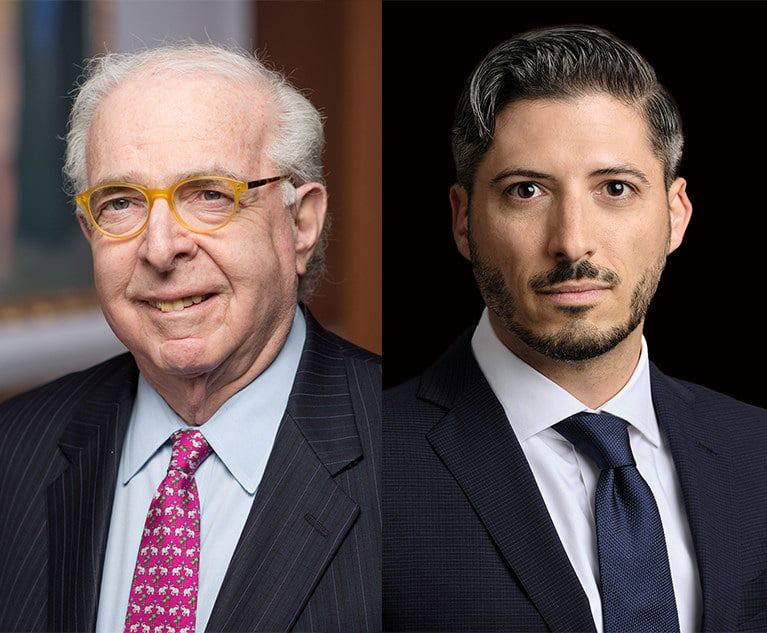The Pitfalls of Conflicting Judicial Outcomes in International Arbitration: Lessons from 'Kabab-Ji v. Kout Food Group'
In two recent cases arising from a single arbitration, the courts of England and France reached opposite results on what law governs the parties' agreement to arbitrate. These two divergent views led to two significantly different outcomes highlighting the pitfalls of international arbitration: The UK Supreme Court denied enforcement of the arbitration award while the French court upheld it. This article explores the circumstances that led to this awkward outcome and the key takeaways.
April 01, 2022 at 11:15 AM
7 minute read
 International contracting parties often turn to arbitration to avoid potentially biased national courts when disputes arise. However, even if they choose arbitration, disputants remain subject to the whims of domestic courts when they seek to enforce an arbitration award. In two recent cases arising from a single arbitration, the courts of England and France reached opposite results on what law governs the parties' agreement to arbitrate. These two divergent views led to two significantly different outcomes highlighting the pitfalls of international arbitration: The UK Supreme Court denied enforcement of the arbitration award while the French court upheld it. This article explores the circumstances that led to this awkward outcome and the key takeaways.
International contracting parties often turn to arbitration to avoid potentially biased national courts when disputes arise. However, even if they choose arbitration, disputants remain subject to the whims of domestic courts when they seek to enforce an arbitration award. In two recent cases arising from a single arbitration, the courts of England and France reached opposite results on what law governs the parties' agreement to arbitrate. These two divergent views led to two significantly different outcomes highlighting the pitfalls of international arbitration: The UK Supreme Court denied enforcement of the arbitration award while the French court upheld it. This article explores the circumstances that led to this awkward outcome and the key takeaways.
Background. The case of 'Kabab-Ji v. Kout Food Group (KFG)' involves a Lebanese company, Kabab-Ji, that had entered into a series of franchise agreements (FAs) with a Kuwaiti company. Thereafter, the Kuwaiti counterpart underwent a corporate restructuring whereby it became a subsidiary of a new holding company, KFG. When a dispute arose under the FAs, Kabab-Ji initiated arbitration proceedings against KFG with the International Chamber of Commerce in Paris, in accordance with the FAs. However, KFG was not a party to any of the FAs and thus took part in the arbitration under protest. In deciding on KFG's argument that it was not subject to the arbitration agreement since it wasn't a party to the FAs, the Tribunal noted that the arbitration clause was silent as to the law governing the agreement to arbitrate. It rejected the argument that the law of the contract, namely English law, should therefore apply to the arbitration agreement. Instead, it concluded that the law of the seat of the arbitration, in this case French law, should apply to the procedural matters. Applying French law, the Tribunal determined that KFG was bound by the FAs and ultimately found that it was in breach of its contractual obligations. It thus issued an award in favor of Kabab-Ji.
KFG subsequently filed an annulment application before the Paris Court of Appeal. It also sought to have the enforcement of the award set aside by the UK court to which Kabab-Ji had applied. Ultimately, the French court of appeal agreed with the Tribunal and thus concluded that KFG is bound by the arbitration agreement. The UK Supreme Court, however, determined that the Tribunal should have applied English law to the arbitration agreement, pursuant to which KFG is not bound by the FAs. It therefore found that enforcement of the award should be rejected.
This content has been archived. It is available through our partners, LexisNexis® and Bloomberg Law.
To view this content, please continue to their sites.
Not a Lexis Subscriber?
Subscribe Now
Not a Bloomberg Law Subscriber?
Subscribe Now
NOT FOR REPRINT
© 2025 ALM Global, LLC, All Rights Reserved. Request academic re-use from www.copyright.com. All other uses, submit a request to [email protected]. For more information visit Asset & Logo Licensing.
You Might Like
View All
Art of the Settlement: Trump Attorney Reveals Strategy in ABC Lawsuit

Evolving Legal Standards to Combat Disqualification of Arbitrators for Failing to Disclose Conflicts of Interest
8 minute read
Court of Appeals Holds that Arbitration Agreements Can Be Formed Through ‘Clickwrap’ Process
8 minute read
Trending Stories
Who Got The Work
J. Brugh Lower of Gibbons has entered an appearance for industrial equipment supplier Devco Corporation in a pending trademark infringement lawsuit. The suit, accusing the defendant of selling knock-off Graco products, was filed Dec. 18 in New Jersey District Court by Rivkin Radler on behalf of Graco Inc. and Graco Minnesota. The case, assigned to U.S. District Judge Zahid N. Quraishi, is 3:24-cv-11294, Graco Inc. et al v. Devco Corporation.
Who Got The Work
Rebecca Maller-Stein and Kent A. Yalowitz of Arnold & Porter Kaye Scholer have entered their appearances for Hanaco Venture Capital and its executives, Lior Prosor and David Frankel, in a pending securities lawsuit. The action, filed on Dec. 24 in New York Southern District Court by Zell, Aron & Co. on behalf of Goldeneye Advisors, accuses the defendants of negligently and fraudulently managing the plaintiff's $1 million investment. The case, assigned to U.S. District Judge Vernon S. Broderick, is 1:24-cv-09918, Goldeneye Advisors, LLC v. Hanaco Venture Capital, Ltd. et al.
Who Got The Work
Attorneys from A&O Shearman has stepped in as defense counsel for Toronto-Dominion Bank and other defendants in a pending securities class action. The suit, filed Dec. 11 in New York Southern District Court by Bleichmar Fonti & Auld, accuses the defendants of concealing the bank's 'pervasive' deficiencies in regards to its compliance with the Bank Secrecy Act and the quality of its anti-money laundering controls. The case, assigned to U.S. District Judge Arun Subramanian, is 1:24-cv-09445, Gonzalez v. The Toronto-Dominion Bank et al.
Who Got The Work
Crown Castle International, a Pennsylvania company providing shared communications infrastructure, has turned to Luke D. Wolf of Gordon Rees Scully Mansukhani to fend off a pending breach-of-contract lawsuit. The court action, filed Nov. 25 in Michigan Eastern District Court by Hooper Hathaway PC on behalf of The Town Residences LLC, accuses Crown Castle of failing to transfer approximately $30,000 in utility payments from T-Mobile in breach of a roof-top lease and assignment agreement. The case, assigned to U.S. District Judge Susan K. Declercq, is 2:24-cv-13131, The Town Residences LLC v. T-Mobile US, Inc. et al.
Who Got The Work
Wilfred P. Coronato and Daniel M. Schwartz of McCarter & English have stepped in as defense counsel to Electrolux Home Products Inc. in a pending product liability lawsuit. The court action, filed Nov. 26 in New York Eastern District Court by Poulos Lopiccolo PC and Nagel Rice LLP on behalf of David Stern, alleges that the defendant's refrigerators’ drawers and shelving repeatedly break and fall apart within months after purchase. The case, assigned to U.S. District Judge Joan M. Azrack, is 2:24-cv-08204, Stern v. Electrolux Home Products, Inc.
Featured Firms
Law Offices of Gary Martin Hays & Associates, P.C.
(470) 294-1674
Law Offices of Mark E. Salomone
(857) 444-6468
Smith & Hassler
(713) 739-1250






